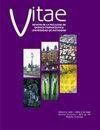麦冬草对手机暴露去卵巢大鼠空间记忆及脑氧化损伤的影响
Q3 Pharmacology, Toxicology and Pharmaceutics
引用次数: 1
摘要
背景:氧化应激、基因表达改变和血脑屏障分解已被证明是由射频辐射(RFR)引起的;因此,寻找能够在一定程度上防止这些影响的药物或食品引起了人们的兴趣。玛卡(Lepidium meyenii,玛卡)是一种土生土长的安第斯植物,因其对女性生殖系统的影响以及免疫调节、提神、抗氧化和营养特性而闻名,因为它含有高浓度的生物碱、氨基酸、硫代葡萄糖苷、脂肪酸和玛卡酰胺。目的:我们的目的是确定饮食中补充玛卡对诱导绝经和/或暴露于手机辐射的大鼠的空间记忆和大脑氧化损伤的影响。方法:将雌性大鼠分为6组(每组6只):未切除卵巢(O-)、切除卵巢(O+)、切除卵巢+雌激素(O+E+)、切除卵巢+雌激素+照射(O+E+I+)、切除卵巢+玛卡(O+M+)、切除卵巢+玛卡+照射(O+M+I)。采用Morris水导航任务测试大鼠空间记忆。处死大鼠,测定脑丙二醛含量。结果:在暴露于手机辐射后,补充玛咖组的空间记忆得到改善,丙二醛水平低于雌激素组。结论:我们的研究结果表明,摄入玛咖对维持记忆和减少手机辐射引起的氧化应激有积极的作用。然而,有必要使用更大的样本量来扩展这项工作。本文章由计算机程序翻译,如有差异,请以英文原文为准。
Effect of Lepidium meyenii (maca) on spatial memory and brain oxidative damage of ovariectomized-rats exposed to mobile phone
Background: Oxidative stress, genetic expression changes, and decomposition of the blood-brain barrier have been shown to be caused by exposure to radiofrequency radiation (RFR); therefore, the search for drugs or food products that offer some protection from these effects has attracted interest. Lepidium meyenii (maca) is a native Andean plant known for its effects on the female reproductive system as well as its immunomodulating, energizing, antioxidant, and nutritive properties due to its high concentration of alkaloids, amino acids, glucosinolates, fatty acids, and macamides. Objectives: We aim to determine the effect of dietary maca supplementation on spatial memory and cerebral oxidative damage in rats with induced menopause and/or with exposure to mobile phone radiation. Method: Female rats divided into 6 groups (six rats in each group): control or not ovariectomized (O-), ovariectomized (O+), ovariectomized + estrogen (O+E+), ovariectomized + estrogen + irradiated (O+E+I+), ovariectomized + maca (O+M+), and ovariectomized + maca + irradiated (O+M+I). Rat spatial memory was tested using the Morris water navigation task. Rats were sacrificed, and cerebral malondialdehyde was measured. Results: After exposure to mobile phone radiation, the group supplemented with maca showed improved spatial memory and lower levels of malondialdehyde than the estrogenized group. Conclusions: Our results suggest that consumption of maca has a positive effect on the maintenance of memory and decreases oxidative stress caused by mobile phone radiation. However, it is necessary to extend this work using a larger sample size.
求助全文
通过发布文献求助,成功后即可免费获取论文全文。
去求助
来源期刊

Vitae
PHARMACOLOGY & PHARMACY-
CiteScore
1.20
自引率
0.00%
发文量
0
审稿时长
>12 weeks
期刊介绍:
The journal VITAE is the four-monthly official publication of the School of Pharmaceutical and Food Sciences, and its mission is the diffusion of the scientific and investigative knowledge in the various fields of pharmaceutical and food research, and their related industries. The Journal VITAE is an open-access journal that publishes original and unpublished manuscripts, which are selected by the Editorial Board and then peer-reviewed. The editorial pages express the opinion of the Faculty regarding the various topics of interest. The judgments, opinions, and points of view expressed in the published articles are the responsibility of their authors.
 求助内容:
求助内容: 应助结果提醒方式:
应助结果提醒方式:


